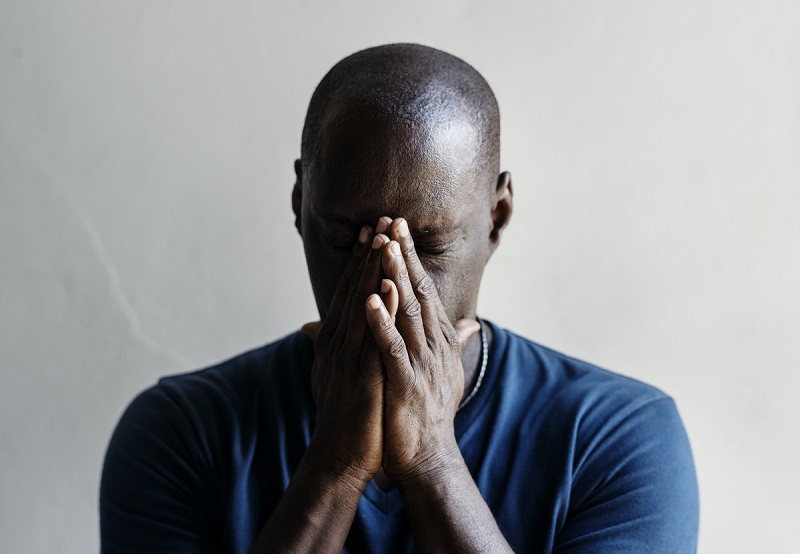Dating Someone With Anxiety Disorder: How To Be There For Your Partner
- For those experiencing suicidal thoughts, please contact the 988 Suicide & Crisis Lifeline at 988
- For those experiencing abuse, please contact the Domestic Violence Hotline at 1-800-799-SAFE (7233)
- For those experiencing substance use, please contact SAMHSA National Helpline at 1-800-662-4357
Does your partner live with an anxiety disorder? Whether they've been diagnosed or they haven't, you may be able to tell that anxiety is taking a big toll on their life. If you're in a relationship or living with someone with anxiety, it could be taking a big toll on your life as well. When you're dating someone with anxiety disorder, you may need to approach the relationship differently and take a closer look at what it is that your partner needs from you and how to provide it.

What is anxiety disorder?
First, let's take a closer look at what an anxiety disorder is. Most people, if not all, feel anxious sometimes. We may get overwhelmed or feel unprepared for certain situations. When that anxiety starts affecting numerous aspects of our lives, or overall mental health, though, we may have begun experiencing an anxiety disorder.
Individuals with this type of disorder often feel fear or anxiety that is out of proportion to the underlying situation. This anxiety might impair their ability to function at their regular levels. It’s important to remember, however, that extreme situations where the individual has a legitimate reason to be afraid, such as a car accident, or an age-appropriate reason to be afraid, such as being fearful of the dark at a young age, would not be considered part of an anxiety disorder.
Additionally, there are various types of anxiety disorders, including generalized anxiety disorder (GAD), panic disorder, social anxiety, post-traumatic stress disorder (PTSD), and obsessive compulsive disorder (OCD), among others. The specifics of your partner’s anxiety disorder may be helpful when determining the best ways to support your partner.
Dating someone with an anxiety disorder
So, what can you do if you’re in a relationship with someone living with an anxiety disorder? How can you continue to love and support them in healthy ways that will benefit everyone involved in the relationship? Below are several ways you can be there for your partner.
1. Clear the air about dating someone with an anxiety disorder
Talk to your partner about their anxiety. That means sitting down with them in a space where they feel the most comfortable and asking them questions. Find out what they are and aren't comfortable with. Find out what they would like you to do when they experience an uptick in anxiety or a panic attack. Just as importantly, find out what they don't want you to do if they're in the middle of an attack. It might not be an easy conversation for either of you, but it will likely make the relationship healthier in the long run.
2. Watch for triggers related to your partner’s anxiety
You may be able to recognize situations that are making your partner uncomfortable before they even mention anything. Maybe your partner is experiencing new relationship anxiety. You want your partner to push themselves if they feel comfortable doing so, but you also want to be aware of when they're reaching their limits or when they're too uncomfortable so that you can step in. Being observant of physical symptoms and watching for triggers so that you can react appropriately can help improve the quality of the relationship and your partner’s trust in you.

3. Be patient with them for better mental health
When your partner is experiencing an anxiety attack, you must try to be as patient as possible. If they are trying to work through their anxiety, perhaps try letting them go at their own pace. It's rarely easy trying to break out of your shell, let alone trying to break through intense anxiety. This means your partner will probably need you to be patient. Try to give them time to work through what they're experiencing and what they're trying to achieve. It might take time, and it might not happen the first time (it probably won't), but they likely need you to recognize their efforts.
4. Remain calm to support your partner through anxiety disorders
Your partner will probably look to you as their rock and support system. When you're able to remain calm and continue offering support while they're experiencing an attack, your partner may find it easier to remain grounded and feel secure. Your calm presence can also reassure them they are not alone in their struggle. This can help them understand how to approach anxiety and gradually regain control.
5. Be realistic
Trying to reason with someone who is experiencing anxiety is usually not helpful. If you love someone with anxiety, you should understand that their responses may not always be rational. When they are not in the middle of an attack, they may be able to speak with you about appropriate reactions on your part. But that doesn't mean that they can remain in control when panic attacks come or when they find themselves in a stressful situation. Telling them that their reaction is unreasonable during an attack is also unhelpful.
6. Realize challenging situations occur apart from anxiety
Your partner may have severe anxiety. It may seem as if they have anxiety about many things in their life. That doesn't mean, however, that their anxiety is to blame every time a challenging situation arises. Alongside that, it may not be beneficial to allow your partner to blame every disagreement or every decision that they make on their anxiety. Everyone makes good and bad choices at different times, and you'll both have to face up to those things throughout the relationship.
7. Let it roll off
Your partner may have anxiety about you that you feel is unfounded or unfair. They may accuse you of different things that cause you to feel offended. They may also lash out at you in different ways. These things are common symptoms of anxiety, and they could very well be a side effect of what they are experiencing. Understanding that they react this way because of their anxiety can help your relationship move forward. If you feel that your partner is mentally or emotionally abusive in their treatment of you, however, it is even more important that you both seek professional help.
If you worry that you or a loved one may be in a domestic abuse situation, please reach out to the National Domestic Violence Hotline by dialing 800.799.SAFE (7233). Help is available 24 hours a day, seven days a week.
8. Know that you can't 'fix' it
Living with an anxiety disorder can be a serious situation, and it's likely not something that you're going to be able to just fix on your own. You will not be able to just talk your partner out of their anxiety disorder, and you shouldn't feel obligated to try. This is a condition that they will probably need professional help to get through. While you can be their support system, don’t feel like you must be the only person they are relying on to get them through this.
9. Encourage them to get professional help through therapy

Your partner might need encouragement to seek out professional help and talk to someone who can help them work through their feelings. A mental health professional might be able to talk with them about what they're experiencing and help make sure they're working through their anxiety in healthy ways. They can often try helping them walk them through exercises and tasks that help build up their confidence levels and gradually work through any challenges. Encouraging them to engage in therapy shows that you care about their well-being and support their journey. This can be extremely important for them as well as your relationship.
Getting professional help
Regain offers professional help for a wide array of mental health conditions, including anxiety. You'll be able to find several therapists and mental health professionals who can help you work through complex feelings and emotions. The service is done entirely online, so you never have a reason to leave your home to attend. This can make it easier for someone who is struggling with an anxiety disorder because they can stay in a comfortable location and situation while still having important conversations. Studies have shown that online CBT (cognitive behavioral therapy) is often effective in helping individuals deal with symptoms of anxiety. With Regain, you can attend therapy sessions either with your partner or alone. Even individual therapy can be enormously helpful, as studies have demonstrated a clear link between your mental health and the quality of your romantic and intimate relationships.
If your partner is seeking professional help, it may also be a good idea for you to talk with a mental health professional. This can help you to work through any feelings you may be experiencing and better understand what it means to be in a relationship with someone who has anxiety.
Takeaway
Both dating someone with anxiety and living with an anxiety disorder can be challenging, but there are resources to help you and your partner achieve a healthy and mutually beneficial relationship. Anxiety does not have to dominate your life or define your relationship. Relationships or individual counseling can make a huge difference.
What to do when you're dating someone with anxiety disorder?
If you’re dating someone with anxiety, be patient. Anxiety can make your partner feel like they’re drowning in a sea of worry and fear. It can be hard for them to think clearly or behave normally when they’re feeling anxious. Try not to judge them on how they react when their anxiety strikes; it likely has nothing to do with you or anything else going on in their lives. Talking to someone with anxiety can be tough, but it’s often a good idea to try and understand what they’re going through. Learn as much as you can about anxiety disorders, and ask your partner if there are any books or websites that they find helpful. Don’t dismiss their feelings or make fun of them for feeling anxious; instead, try to be supportive and understanding.
How can I help my partner manage their anxiety disorders and improve their mental health?
To help your partner manage their anxiety disorders and improve their mental health, create a supportive environment by listening to their concerns and encouraging open communication about their feelings. Engaging in activities that promote stress-free relaxation and reduce stress can also be beneficial.
What role does therapy play in supporting my partner's anxiety?
Therapy can help your partner's anxiety by giving them tools to cope and understand their feelings more clearly. It also offers a safe space where you can both talk about how their anxiety affects your relationship and find ways to build and strengthen your bond.
- Previous Article
- Next Article